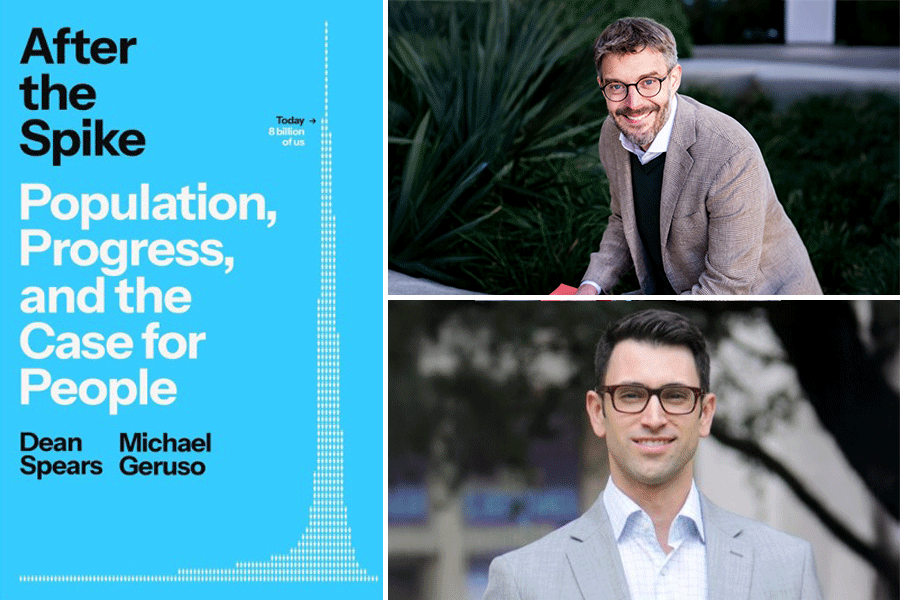Infant mortality among Hindus is higher than Muslims in India because of open defecation, Dean Spears and Michael Geruso, the two US economists in the eye of global attention with their book that says humanity is on a path to depopulation, had claimed in a paper in 2014.
The duo, affiliated with the Population Wellbeing Initiative (PWI) at the University of Texas at Austin, have co-authored the book, After the Spike: Population, Progress, and the Case for People.
“Humanity is on a path to depopulation,” says the first line of the book. The blurb says the book is “a wakeup call, explaining why global depopulation is coming, why it matters, and what to do now.”
Critics have argued that the book lends support to billionaire-investor Elon Musk’s theories on population collapse. Musk had given $10 million to the PWI, as reported by Bloomberg recently.
Geruso told The Telegraph Online that their book does not reflect the views of any of the funders of the research, nor of any of the people they have thanked. No funder had the opportunity to review this book in advance, he said.
“The background research that went into this book was supported by several funders, including The Smith Richardson Foundation, the Eunice Kennedy Shriver National Institute of Child Health and Human Development (part of the the US NIH), the National Institute on Aging (also part of the US NIH), the Musk Foundation, and the Bill & Melinda Gates Foundation,” Geruso said.
“I have no idea whether Bill or Melinda Gates, Elon Musk, or the programme officers and other civil servants at the US National Institutes of Health would agree with the perspectives of our book,” he added.
Geruso and Spears on India
More than a decade ago, Geruso and Spears had published another study, which raised eyebrows in India.
In March 2014, they published a paper titled “Sanitation and health externalities: Resolving the Muslim mortality paradox”.
The paper claimed that despite being poorer and less educated, Muslims in India have lower child mortality rates than Hindus because Hindus are 40 per cent more likely to practise open defecation, which spreads disease and explains the [then] 18 per cent mortality gap.
The study analysed data from three rounds of India’s National Family Health Survey (NFHS) — 1992–93, 1998–99, and 2005–06 — to collect information on women aged 13 to 49, their children, and household conditions. The data included child health indicators, household assets, and sanitation practices.
The sample included approximately 310,000 Hindu and Muslim children born within 10 years prior to each survey round. Key outcomes were infant mortality (deaths before age one) and child mortality (deaths before age five), per 1,000 live births.
In October 2014, Prime Minister Narendra Modi launched the Swachh Bharat Mission to stop open defecation.
Four years later, Geruso and Spears co-authored another paper “Neighborhood Sanitation and Infant Mortality” published in the American Economic Journal: Applied Economics.
“Muslim children are substantially more likely than Hindu children to survive to their first birthday, even though Indian Muslims have lower wealth, consumption, educational attainment, and access to state services,” the paper said.
The reason cited was the same. Open defecation.
Do Spears and Geruso still believe in their findings?
“Child mortality advantage accrues not to Muslim households themselves but rather to their neighbours, who are also statistically likely to be Muslim,” Geruso told The Telegraph Online. We submitted this paper to the journal about a decade ago, it was published seven years ago, and it mainly uses data from about two decades ago or earlier.”
Asked if the Swachh Bharat Mission had changed the ground reality, Geruso said he asked Dean who said that as far as he was aware, there have not been any new independent, credible data that separate latrine use and latrine ownership for recent years.
The latest National Family Health Survey data (round 5, conducted between 2019 and 2021) showed rural open defecation has declined, but as Geruso said, “There was still unfortunately much of it in Uttar Pradesh and Bihar.”
He added: “How much of that decline is due to the Swachh Bharat efforts is a further question that would require even more and better data to answer credibly. But yes, one future to work for is one where open defecation rates in rural UP and Bihar are close to zero, so no children from any community are threatened by it.”
‘After the Spike uses metaphors’
In their book After the Spike, Geruso and Spears say they try to explain what “depopulation would mean for the climate, for living standards, for equity, for progress, for freedom, for humanity’s general welfare”.
Both the economists think catastrophic events could pose risks leading to depopulation, such as an enormous asteroid hitting Earth, pandemics, supervolcanos, climate change and rogue Artificial Intelligence.
But Geruso and Spears say these are just metaphors, which critics have misunderstood.
“If some external catastrophic event happens (but not because of population decline), then one consequence is that there might not be enough of us around to address big, shared challenges that we need to solve together,” Geruso told The Telegraph Online.
“The metaphors are just that, metaphors, as we called in boldface “some problems are like asteroids.” The goal of these metaphors is to simplify the logic of the realistic, important, and shared challenges we discuss, including developing a new vaccine for a novel pandemic or removing carbon from the atmosphere,” he added.
“A larger population, when faced by shared threats like a novel virus or shared goals like carbon removal, may be better prepared to face these.”











